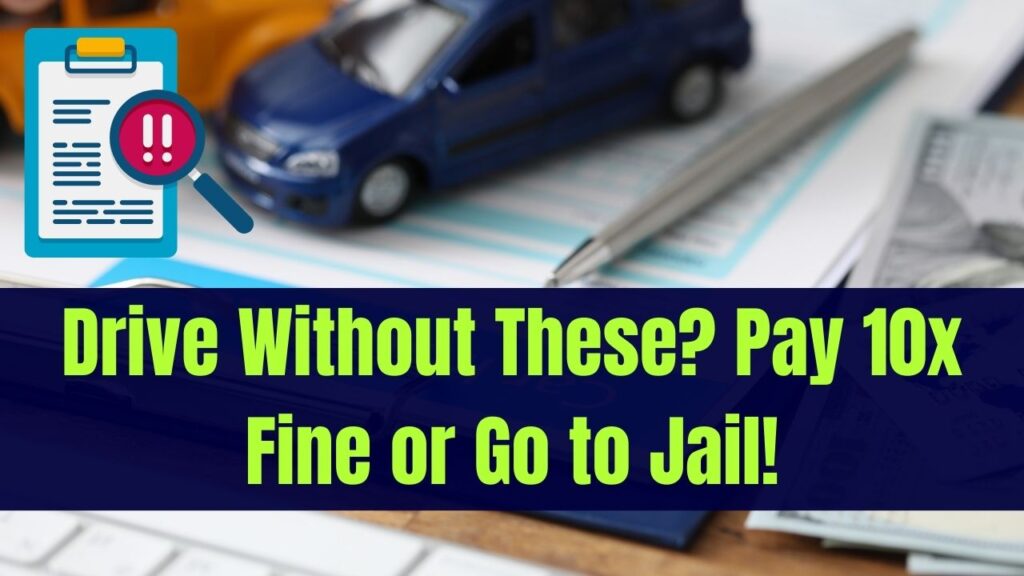
Driving in India isn’t just about reaching your destination—it’s also about following the law and being responsible. A recent government alert warns that not carrying mandatory vehicle documents like your driving licence, insurance, and pollution certificate could now land you in serious legal trouble, including fines up to 10 times higher and jail time. This is part of the stricter enforcement under India’s new traffic rules rolling out in 2025.
Whether you’re a new driver or a seasoned professional, it’s important to understand what documents are essential and how to stay compliant. In this article, we break down everything you need to know in a clear, professional, and easy-to-follow format.
Vehicle Documents Alert
| Document | Penalty for Non-Compliance |
|---|---|
| Driving Licence | ₹5,000 fine, up to 3 months jail, mandatory community service |
| Registration Certificate (RC) | ₹5,000 fine |
| Pollution Under Control (PUC) | ₹10,000 fine, 6 months jail, vehicle impoundment possible |
| Insurance Certificate | ₹2,000–₹4,000 fine, possible jail for repeated offenses |
| New 2025 Rule Additions | Strict checks using automated systems, facial recognition for driver licence verification, e-challan integration expanding |
Staying compliant with vehicle document requirements is no longer just good practice—it’s a legal necessity. With India’s new, stricter traffic enforcement measures in 2025, the cost of forgetting your papers could be jail time, heavy fines, or even a seized vehicle. Don’t take chances. Stay organized, go digital, and be road ready.
Why These Rules Exist
According to the Ministry of Road Transport and Highways, India reported over 4.6 lakh road accidents in 2022, leading to more than 1.5 lakh fatalities. Many were due to unlicensed drivers, uninsured vehicles, or expired pollution certificates. The new rules are designed to tighten oversight, promote safety, and enforce accountability on Indian roads.
Mandatory Vehicle Documents (Explained)
Driving Licence (DL)
A valid Driving Licence proves you’re authorized to drive. The penalty for driving without one is ₹5,000, up to 3 months in jail, and community service.
Tip: You can store a digital copy using DigiLocker or mParivahan—both are legally accepted by traffic authorities.
Registration Certificate (RC)
The RC is your vehicle’s birth certificate. If you’re pulled over without it, expect a ₹5,000 fine. Always keep a soft copy in your mobile app or a laminated original in your glove box.
Pollution Under Control (PUC) Certificate
With rising pollution levels, especially in cities like Delhi, Mumbai, and Bangalore, your PUC Certificate is non-negotiable. Violators face a ₹10,000 fine and/or six months’ imprisonment. Repeat offenders may even have their vehicle impounded.
Valid Insurance Certificate
Driving without at least third-party insurance is a serious offense. First-time offenders may pay ₹2,000, and repeat violations can attract ₹4,000 fines or even jail.
Pro Tip: Install apps like Policy Bazaar or ACKO to renew and store your policy digitally.
What’s New in 2025?
- Automated Enforcement Zones: Red-light jumpers and violators are tracked via CCTV and e-challan systems.
- AI-based Facial Recognition: Used to verify the authenticity of driver licences during traffic stops.
- Integrated e-Challan System: All pending challans must be cleared before RC renewal or fitness test.
- Vehicle Seizure Rules Tightened: For habitual offenders or fake documents, police can seize vehicles without a court order.
Real-Life Example: A Wake-Up Call
In January 2025, a delivery driver in Pune was fined ₹27,000 after being caught without insurance, a PUC certificate, and an expired licence. His bike was impounded for 7 days, and he had to appear in court.
Lesson? Don’t wait until something goes wrong—check your documents regularly.
For Fleet Owners and Commercial Drivers
- Maintain a document checklist for all vehicles.
- Use a fleet management system to track insurance renewals and PUC expiry.
- Ensure all drivers have valid licences for the correct vehicle class (e.g., LMV, HMV).
Bengaluru Traffic Update: Heavy Traffic Jam in Multiple Areas – Check Alternative Routes Here
Big Traffic Rule Update! Fines Hiked 10 Times – See Latest Challan Rates
Home Rent Rules 2025: How New Tenancy Laws is Benefiting Landlords & Tenants in India
Quick Safe Driving Checklist
- Driving Licence (physical/digital)
- Valid RC
- PUC Certificate
- Insurance Policy
- Road tax paid
- Reflective tapes (for commercial vehicles)
- Emergency kit and first aid box
FAQs About Vehicle Documents Alert
Q1. Are digital copies of documents valid in India?
Yes. Digital documents in DigiLocker and mParivahan are accepted under the IT Act and MoRTH guidelines.
Q2. How often should I renew my PUC certificate?
Every 6 months for most vehicles but check local emission norms for diesel or older vehicles.
Q3. Can I be jailed for missing documents?
Yes. Repeated or serious violations—especially for no DL or PUC—can lead to imprisonment under the amended rules.
Q4. Where can I check my pending challans or document status?
Visit the official Parivahan portal for status updates, challan payments, and more.
Q5. Is community service mandatory for violations?
Yes, in some cases like driving without a licence or insurance, community service hours are imposed along with fines.







